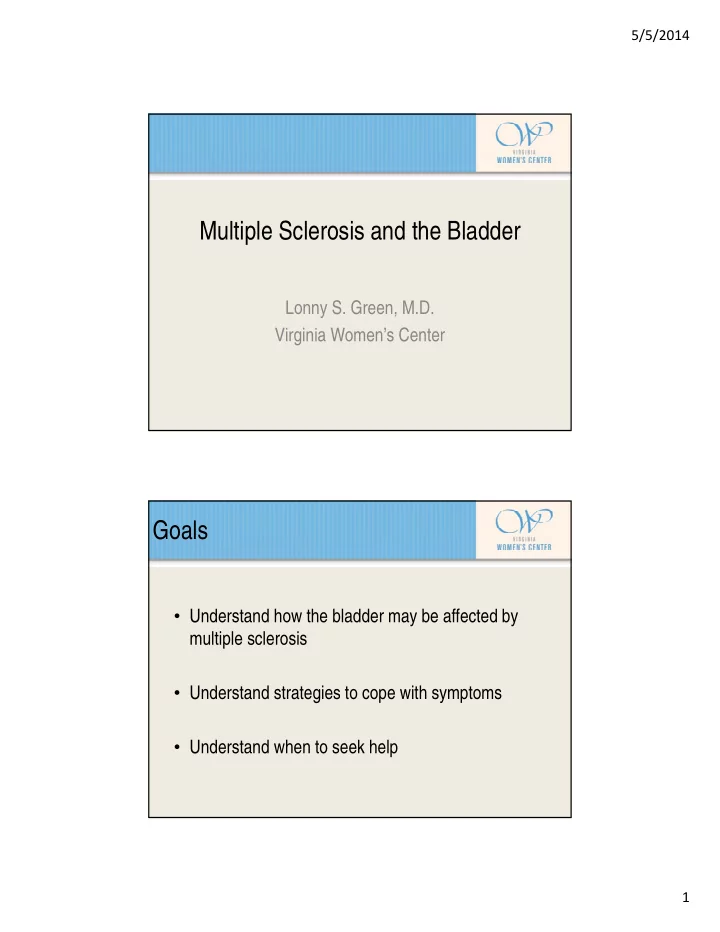

5/5/2014 Multiple Sclerosis and the Bladder Lonny S. Green, M.D. Virginia Women’s Center Goals • Understand how the bladder may be affected by multiple sclerosis • Understand strategies to cope with symptoms • Understand when to seek help 1
5/5/2014 Plan of Action • Understand normal anatomy and function • Understand problems that may arise • Understand assessment methods • Understand symptom management Definition • Urinary incontinence is an involuntary loss of urine • It is NOT normal at any adult age 2
5/5/2014 Ignorance is the Rule… Not the Exception • 83% of adults know little or nothing about incontinence • 72% of adults are not aware of any medical treatment option for incontinence Millions Suffer in Silence… Just waiting for encouragement • Many women wait several years before discussing incontinence with a physician – 1999 NAFC Study: Incontinent patients hide their condition on avg. 7.5 years • Incontinence sufferers want to know their options 3
5/5/2014 Embarrassment and Fear of Incontinence are Rampant • 81% of adults are “ very concerned ” about becoming incontinent • 55% of adults are too embarrassed and discouraged to discuss the subject Impact on Quality of Life • Fear of odor • Embarrassment • Limitation of daily activities • Decrease intimacy – 24% women report losing urine during intercourse • Social isolation • Low self-esteem • Depression – 2-3 times higher • Sleep disturbances 4
5/5/2014 5
5/5/2014 Types of Urinary Incontinence • Stress - involuntary loss of urine during coughing, sneezing, laughing or other physical activities. • Urge - involuntary loss of urine associated with an abrupt and strong desire to void. Typically patients have little or no warning to void. • Mixed - a combination of stress and urge incontinence. 6
5/5/2014 “Neurogenic Bladder” • A bladder whose function is affected by a neurologic process • MS: demyelination can interfere with signals between brain, spinal cord and bladder Bladder Symptoms • Urgency • Frequency • Urge Incontinence • Hesitancy • Nocturia • Infections 7
5/5/2014 Work Up • History • Physical • Imaging, if appropriate • Labs • Diagnostics: UD, other Bladder Function • Store urine at low pressures • Empty urine at appropriate place and time 8
5/5/2014 Bladder Problems • Failure to store • Failure to empty Failure to Store • Frequency • Urgency • Urge Incontinence 9
5/5/2014 Management • Timed voids • Reduce bladder irritants • Exercises • Clothing strategies • Medications Medications: Storage Issues • Anticholinergics: Ditropan, Oxytrol, Detrol, Levsin, Vesicare, Enablex. Sanctura, Gelnique • Beta 3 Agonist: Myrbetriq 10
5/5/2014 Medications: Storage Issues • BOTOX Failure to Empty • Bladder Dysfunction • Outlet (sphincter) dysfunction – Sx: elevated PVR; hesitancy; UTI’s 11
5/5/2014 Failure to Empty: Treatments • Timed and double voiding • Check positioning • Self-catheterization • Alpha blockers Other Treatments • Suprapubic Tube • Diversion 12
5/5/2014 13
Recommend
More recommend